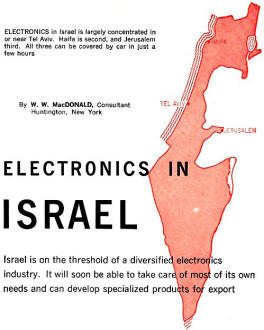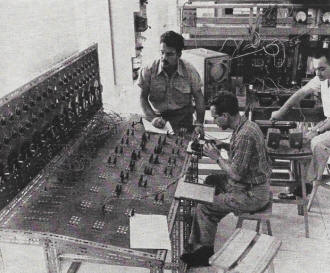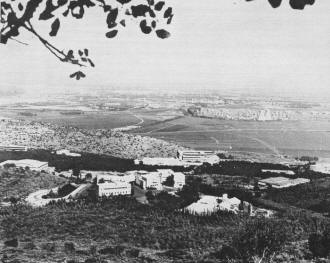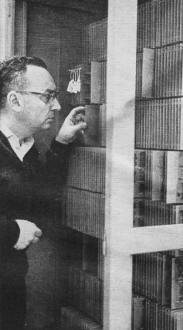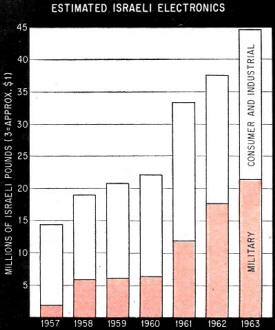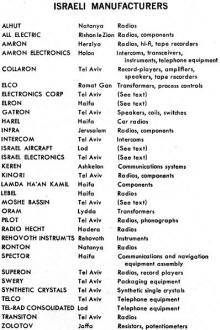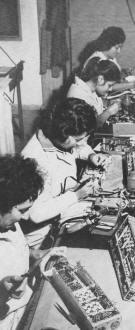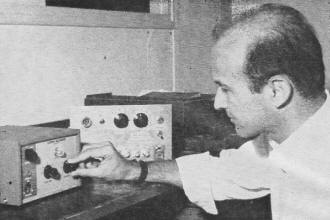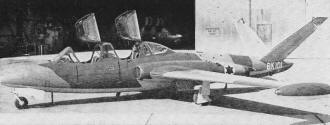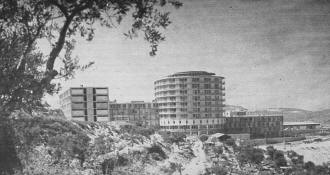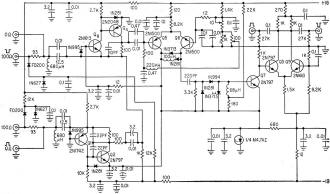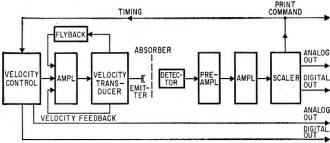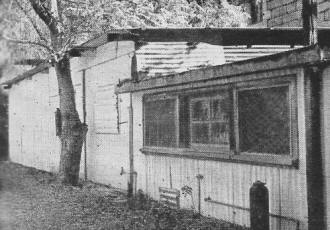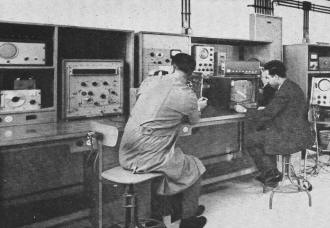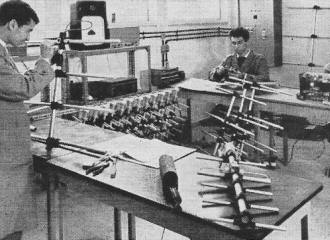Electronics in Israel |
|
Once World War II and the Korean War were through consuming a large percentage of the world's material and labor resources, technology focus shifted largely toward inventing and manufacturing consumer goods. It was a period similar to the Roaring Twenties, after World War I where innovation and high employment fueled good times for a lot of the population. Creature comforts like indoor plumbing, refrigerators, electric toasters and can openers, radio, affordable automobiles, were appearing in the majority of homes. Unfortunately, not all countries enjoyed the upturn during those eras, usually because of continued war and/or oppressive Communist / Socialist / Marxist regimes. Israel did not formally become a country again until 1948, having been ruled by Great Britain since World War I. Beginning in the 1950s, the technological capabilities of Israel grew at a significant rate even in the face of constant threats and acts of terrorism against it. Electronics magazine published this article in 1964 reporting on the state of electronics in the State of Israel. Israel ranks 13th in the number of patents granted by the U.S. Patent and Trademark Office (USPTO) - pretty good for a country so small you can barely see it on a world map. Interestingly, the spell checker in Expression Web flagged the word "constricture," used in this article, as illegitimate. A Web search confirms it. It sure sounds like a real word, but evidently it is not. "Constriction" is real, of course. Maybe "constricture" was an accepted part of medical spoken parlance in the day, but if it was in writing, some example of usage would appear in a search. Separate reports are included for West Germany (the Berlin Wall was still up then), the United Kingdom, France, Denmark, Austria, Sweden, Belgium, Switzerland, the Netherlands, and Italy. Russia, although obviously not part of Europe, is also covered. Electronics in Israel Electronics in Israel is largely concentrated in or near Tel Aviv. Haifa is second, and Jerusalem third. All three can be covered by car in just a few hours. By W. W. MacDonald, Consultant, Huntington, New York Israel is on the threshold of a diversified electronics industry. It will soon be able to take car of most of its own needs and can develop specialized products for export Israel is on the threshold of a diversified electronics industry, give or take a year. It will soon be able to take care of most of its own needs and can in time develop specialized products for export. What these specialties will be, when and where they will find a market, cannot at this time be safely predicted. But the obvious dedication of a people moving swiftly from the communal-farming kibbutz to a modern manufacturing economy is speeding up the timetable. The country has one natural advantage, the possession of scientist-educators second to none in quality and far above most other lands in quantity proportional to population. They have, or soon will have, physical facilities that would be envied by men working in many other places, and operate in an atmosphere that is particularly conducive to basic research. They are turning out engineers at a phenomenal rate, and these are backstopped to an unusual extent by technicians graduated from vocational schools. Research is relatively inexpensive. Students of electrical engineering at Technion measuring small magnetic fields. Technion, on Mount Carmel. The Valley of Zebulon is in the background, and beyond that Haifa Bay. Momentarily, the heavy emphasis upon basic research and education which is Israel's heritage is also a disadvantage, because many areas under investigation are primarily of academic interest, and because there is some notable tendency to consider the conversion of ideas that do have commercial value slightly "dirty". Then too, the growing crop of new engineers raised in this climate does not yet have within the country's borders enough industry to provide practical experience, with the result that there is a deficiency in immediate ability to develop and design. This explains why there is at one and the same time a surplus and shortage of such talent, the first in the area of basic research and the second in the area of application. Education and Research - While the Department of Defense and other government agencies do directly engage in some research, and infant industry shows incipient signs of becoming more interested in the applied variety, by far the bulk of it is currently done by three institutions. Here the business of researching for the sake of research, doing it on contract for anyone anywhere who suggests the subject and provides financial support, and educating, is so intertwined among both teachers and students seeking a master's degree that it is difficult to determine where one ends and the other begins. Technion, Israel Institute of Technology at Haifa, turns out most of the country's engineers. The electrical engineering department is currently engaged in applied research on a number of subjects important in the field of electronics. Such as: Analog computers. Instrumentation for measurement of physical quantities like turbulence in fluid dynamics, correlation measurements, wideband mechanical vibration measurements, low level d.c. Fast-current pulse amplifiers with nanosecond rise time. Instrumentation for nuclear research, including fast time-to-amplitude converters. Microcircuitry. Magnetic films. And systems needed for ionospheric and solar research. An electronics institute was originally set up as a maintenance laboratory for the electrical engineering department but now also designs and builds some equipment. Among items developed here recently are: Stabilized voltage and current supplies. Electronic switches. Audio oscillators. Pulse generators. Special-purpose sweep-frequency oscillators. Special-purpose curve tracers for semiconductors. And control instruments for asynchronous motors. Awareness of the fact that Israel has a gap to bridge between basic research and application has caused the school to set up a more or less separate organization to explore the latter area. It will need time to get off the ground. There is also a link to a private corporation in Haifa that manufactures instruments. World-famous Weizmann Institute of Science, at Rehovoth, is primarily concerned with basic research, and among its current high-level projects are the following:
The institute has set up a separate corporation, Yeda, to develop devices that appear to have future market possibilities. One of these is a transistorized EEG amplifier and transmitter that sends electric brain potentials to a nearby receiver-recorder without interconnecting wires. Another is the Fragilograph, an instrument that provides a rapid and accurate determination of the osmotic fragility of red blood cells. A novel electrodynamic transducer design was introduced some time ago (ELECTRONICS, p 93, Feb. 12, 1960) to makers of loudspeakers, and a company operating under license in France has manufactured microphones employing the principle. Financial return to the institute has not, so far, been fantastique. The department of applied mathematics is building a high-speed computer, called Golem, which in its overall organization and logic is patterned after the American Illiac II but achieves in its central processor a reduction in size by a factor of 10 and a reduction in transistor count by a factor of four. It uses epitaxial mesa transistors in combination with fast germanium diodes, on printed circuit modules, to form saturating logic elements. The two-unit memory, purchased abroad, employs coincident-current magnetic cores and will eventually be capable of handling 16,384 words. The central processor was completed last September, and placed in operation with 8,192 words of memory and paper tape input-output in November. Sometime in the first half of 1964 a magnetic-tape synchronizer and buffer is to be constructed and the computer is scheduled to be in full operation with eight tape transports by July. Sometime within the next two years a magnetic drum or disc is to be added. Speaking generally rather than specifically, there is a tendency in Israeli institutions to build rather than to buy. This is based on the premise that the latest techniques can best be incorporated in equipment in this manner, that greater reliability can be achieved, that it can be done at substantially lower cost, and that the process of building is educational. There is merit in this premise, and also in the opposite school of thought which holds it would be better in many cases to buy and thus gain time for devotion to more important overall objectives. Hebrew University of Jerusalem uses a good deal of electronics in its research program, particularly in the faculty of medicine. Among experimental devices seen there is one intended to continuously watch blood pressure without requiring constricture of the patient's arm except when unusual increases or decreases occur, in which event constricture for precise measurement and recording would be accomplished automatically. Another is a blood-test device requiring transmission of high intensity and therefore very hot light through, say, a patient's finger. To avoid burning, the approach utilizes fibre optics. While it is not yet widely known, Tel Aviv University, which has until recently been a liberal arts school, now also teaches engineering. Faculty is being initially supplied by the Israeli Atomic Energy Commission, which maintains a well-equipped electronics laboratory near its experimental nuclear reactor turning out radioactive isotopes down at Nahal Soreq. It is too early to tell how graduate students will be oriented. Government Manufacturing - Much like the United States in this respect, something over 50 percent of Israel's expenditure for electronics is by the government, and most of this is for defense. Defense is, understandably, highly classified. But this can be said: Army equipment is American made or of similar design, Navy equipment shows both American and British influence, and Air Force equipment is largely French or its locally made equivalent. The remarkable economic progress achieved by the country in its brief 15 years of existence can be attributed largely to the manner in which the government, often aided by the central labor union called Histadrut, has so far employed the very substantial funds contributed by its many friends abroad. Thus there is a tendency for government to continue in the manufacturing business. This appears to be at least temporarily necessary in the case of certain highly specialized needs as, for example, down in the Negev, and there is also some validity in the belief that manufacture of civilian items is a good way to keep defense plants and personnel in standby operation against a day of possible emergency need. On the other hand, it does little to encourage private industry and there is some evidence of frustration in commercial circles despite efforts on the part of government-owned plants to avoid manufacture of competitive items and despite very real tax and other concessions made within the past year-and-a-half to encourage investment of private capital. Largest government-owned corporation in the field of electronics is Israel Aircraft Industries at Lod. It employs 3,500 people overall. Some 300 operate in our field, including 30 engineers and 75 technicians. Established originally under the name Bedek to service military aircraft, this company now also expertly services engines in particular for the several commercial airlines using the nearby airport, builds a modified version of the French Fouga Magister jet trainer aircraft, and a good deal of the electronic equipment needed by the Air Force. This includes a transistorized radio compass, airborne radar, radar test equipment and uhf transceivers. It is also starting to build, for commercial sale to the medical profession, and a-c/d-c defibrillator, a pulse monitor and a cardiac pacemaker. The prototype of an electric respirator is nearing completion. A transistorized intercom system for industrial use is in process of design. Multiple Ownership - It is not uncommon in Israel for a manufacturer to be financed by a plurality of investors who might, in other lands, be considered strange bedfellows. Such is the case at Tadiran, Israel Electronics Industries Ltd., operating seven specialized plants in and near Tel Aviv. Ownership is divided between the Department of Defense, the labor union, and private capital. This aggressive and well-managed company obviously organized with an eye to the future has so far obtained most of its research and development and needed manufacturing knowhow through working arrangements with American companies. It sold IL 1-million worth of goods in 1961 (an Israeli pound is about 1/3 of a U.S. dollar), IL 2-million in 1962, IL 3.46-million in 1963 and hopes to do IL 8-million in 1964. Its product line is already extremely broad, a trait common among even new Israeli companies of any size at this stage of market development. Diversification helps pay the immediate bills, whether or not the present product mix is destined to continue in the future. It probably will be modified but expanded. Communications equipment is made by this company for the Army, to U.S. specifications. Most of the mechanical parts are made in plant, as are printed circuits. Machine shops are relatively plentiful in Israel but it was considered necessary in this instance to buy one and incorporate it within the company in order to secure required close tolerances to which most local shops are not yet accustomed. Plating and other finishes to military specifications also require a good deal of in-plant training. Printed circuits are made in plant for the same reason, as they are also made in several others. A line of transistorized automobile radios has been the commercial mainstay. The company is doing well under license with air conditioners introduced within the past year or so. It also makes battery-operated lanterns, one of which employs a transistorized flasher circuit. Another model automatically provides emergency lighting when local power fails. Up-to-date technically is a division making an extensive line of quartz crystals. So also is another operation using quite modern methods to make a wide range of germanium-transistor types from crystals imported from overseas. Present equipment, and some supervisory personnel, was imported lock, stock and barrel as a complete manufacturing unit from Long Island, New York. It is planned also to make planar silicon types and, later, to fabricate microcircuits. Still another unit has high hopes for its line of surface-barrier detectors featuring especially rugged construction, coaxial connections, no dead layer and individually certified test data. Private Industry - Considering Israel's 2,300,000 population and tender age, it already has a great many manufacturers. Most of them are quite small, have not yet achieved great stability and are trying to get started in electronics by making radio sets or hi-fi equipment primarily for the active home market. There is some exporting to, for instance, Turkey, and long-range promise of business from Africa, but competing with conventional products in most foreign markets is difficult. For one thing, while engineering manpower is comparatively inexpensive in Israel, production and office help is not, and large-scale production methods and machinery have not so far seemed generally supportable. For another, wirewound resistors are one of the few specialized components made in the country other than the transformers most equipment manufacturers wind themselves, and the supply pipeline for parts is both a long and slow one. Too slow, many say. New quarters for Hebrew University medical school, square structure at left, in Eim Kerem near Jerusalem. Buildings at right house Hadassah Medical Center Mossbauer Effect measuring system devised by ron of Haifa. Solid state pulse-height discriminator by Elron. Huts presently housing part of Hebrew University's medical school in Jerusalem, hard by the Jordan border. Checking imported equipment at Moshe Bassin's. Yagi antennas under construction at Moshe Bassin. Whether or not Israel should try to establish a rounded out component parts industry is controversial. There is, on the one hand, a great desire to be self sufficient, and on the other a conviction that the size of the internal market plus immediately available export business for a country whose land borders are closed probably does not warrant such an ambitious program at this time. Most manufacturers of commercial equipment would prefer to buy rather than to make components other than mechanical items. They are, however, handicapped by the relatively small quantities needed and either make them or shop around quite widely, particularly in Europe. Receiving tubes, for example, may come from England or from France. They may also come from Hungary. American components are more common in professional equipment. Next fillip to the internal market could be television, but the manner in which it may be introduced and the date is uncertain. The government, which has long resisted television, is now understood to be receptive to the idea that an educational station up in the hills between Tel Aviv and Jerusalem could materially relieve a growing grade-school teacher shortage. A French financier and philanthropist is said to have promised all or most of the money which would be needed to build such a station. Meanwhile, an estimated 10,000 receivers are already in use, mostly in the north, looking at programs emanating from Arab countries. At least two Israeli manufacturers have sent engineers to France to acquire television receiver design and manufacturing experience, hoping that the proposed educational station could later lead to commercial service. Home equipment for which there is a ready though increasingly competitive market is sometimes the sole manufacturing objective when an Israeli company first enters the electronics business but more often represents just the first hopeful move toward diversification. For example, Electronics Corporation of Israel, in Tel Aviv, a company that has successfully weathered several changes of ownership and acquired useful management experience, attributes 65 percent of its volume to manufacture and sale of the Schneider brand of radios. The remainder, being given increased emphasis, includes contract work for the government and others, the design, manufacture, installation and maintenance of hotel electronic equipment and controls, and some telemetering system work. A public-address-system line is under development, and the company has an eye open for saleable products beyond that. Specialized electronic instruments appear to hold particular promise for Israel in world markets because they could be the natural result of intensive research among the institutions mentioned earlier. Thus there are a number of budding instrument makers. One of these is Elron Electronic Industries Ltd., Haifa, making a Geiger survey meter, a preset electronic counter, single-channel analyzers and a Mossbauer-effect spectrometer. The company believes it has at least a slight technical edge because of its understanding of how best to employ transistors as current amplifiers. Employees have increased from 25 to 55 in the past year, include 10 engineers and 14 technicians. There are, too, highly enterprising manufacturers' representatives who import electronic equipment from abroad but rarely stop at that. For example, Moshe Bassin Electronics & Engineering Ltd., of Tel Aviv specializes in American equipment. It has distribution of a top line of mobile communications gear and has done so well with it that rumors dating back nearly two years to the effect that it might be set up for limited manufacturing persist. The company also handles four well-known non-competitive instrument lines, a professional tape recorder, a good brand of portable generators, a citizens-band transmitter-receiver kit which it assembles itself and sells to gain entre to future commercial communications accounts, and an antenna line. It also makes Yagi antennas of its own for specialized applications and designs and builds accessories needed for application of much of the apparatus it imports to specific system requirements such as those involved in telemetering or interconnection with telephone lines. Digital data transmission suitable for computer input is under study. Two years ago this company employed 15 people. Today it employs 40, which includes eight engineers, 25 technicians and seven field engineers-"No one in Israel, among those with technical training at least, wants to be called a salesman." The Future - Israel's electronics industry is on its way, and will one day be a factor in specialized world markets. The country has the most important ingredients... the need, the brains and, particularly, the necessary drive... and much of what it doesn't have it can acquire. It will not be easy, but then when has birth ever been. The process will be aided by men such as Raanan Amir, who as an Israeli public information officer in New York suggested an on-the-ground look at the beginning of an industry, and who has since returned to his homeland to become Deputy Director of the Industrial Development Bank's Investment Corporation. And by Louis Williams of the Investment Authority in Tel Aviv who, with his associates, arranged and facilitated the trip. And by the many others in government, the institutions and in industry who were so generous with their time. To them all we say... Shalom.
Posted August 16, 2018 |
|

